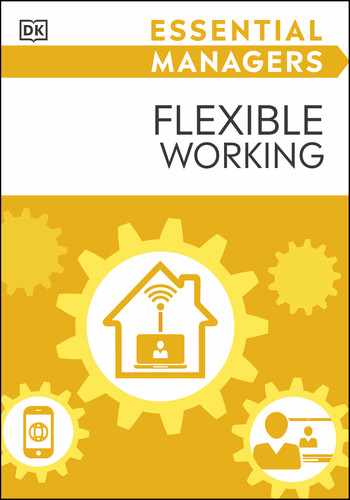
14 / WORKING REMOTELY
She knows
I’m hard of hearing,
but she won’t stop
calling for updates
He’s forgotten
I’m part-time and given
me an impossible
deadline
This call is
overrunning again,
but I have to collect
my kids
Working with others
Collaborating at a distance
When you don’t share a work space, you
can’t pick up on many of the visual cues
that people use when communicating—
or give them out yourself. This means
your interpersonal skills need to come
to the fore. Take time to find out about
your sta through individual catch-ups,
listening carefully, communicating
clearly, and showing empathy.
This will help you to collaborate
successfully, even if you never
meet in person.
To be an eective remote manager, you need to understand your sta and
colleagues. Get to know people properly, and foster a culture of respect
for their individual circumstances, personalities, and working styles.
Communicating well
Stay in regular touch with your team,
but bear in mind that video calls can be
uncomfortable and anxiety-inducing for
some people. Messaging apps such as
Slack (see pp.34–35) are good for getting
quick answers, but a phone call can be
more personal if you need to elaborate
on an issue or gauge a mood. If you’re
not sure what’s best, ask the individual
how they would prefer to talk.
I blocked my
lunch hour in the calendar,
but my manager wants
a meeting
US_014_015_Flexible_Working.indd 14US_014_015_Flexible_Working.indd 14 02/02/2021 11:0502/02/2021 11:05

WORKING WITH OTHERS / 15
Respecting personal
circumstances
Everyone needs a little extra
support and understanding from
their manager at some point. If a sta
member reveals they have a health
condition, find out what they need to get
their work done without cost to their
well-being. Consider what it might be
like for colleagues who live and work
alone—do they need additional support
from you? Recognize that some people
have caring duties for others that put
extra pressure on their time. (Note that
mothers often have the most limited
working hours, and workloads don’t
always shrink to fit.) By working on
an individual level, you can come up
with flexible solutions to help everyone
stay on track.
The more contact
individuals have with their
manager, the better they
feel and more committed
they are to their health
ASK YOURSELF…
YES NOAm I an inclusive manager?
1 Do I use simple language that everyone will understand? ..........
2 Do I consider if I’m talking to someone in their
second language? .............................................................................
3 Do I take time to find out about the other person’s
culture and any related preferences? .............................................
4 Do I oer to switch to video so others can lip read? .....................
5 Do I take diering schedules and personal circumstances
into account when I book a meeting? ...............................................
6 Do I invite every voice to be heard? ................................................
7 Do I pay attention to the timing of calls and time zones when
scheduling a meeting with international team members? ............
US_014_015_Flexible_Working.indd 15US_014_015_Flexible_Working.indd 15 02/02/2021 11:0502/02/2021 11:05
..................Content has been hidden....................
You can't read the all page of ebook, please click here login for view all page.
